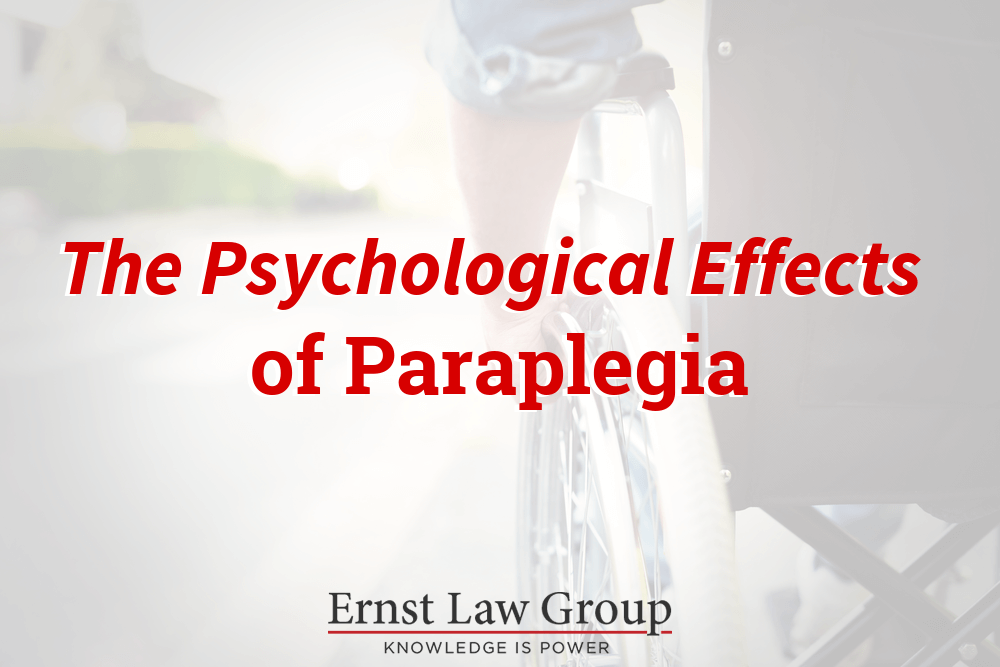Paraplegia is paralysis of the lower extremities caused by a spinal cord injury most often resulting from a severe trauma. The trauma causes the spinal cord to become damaged, bruised, lacerated or severed. The resulting paralysis, which can be partial or complete, strongly affects the individual’s quality of life — including their mental health.
Paraplegia’s impact on the person has been debated. There are definite psychological effects of spinal cord injury but they are unique to each person. Studies indicate that the sudden and often severe change in the individual’s lifestyle can lead to depression and, in some cases, post-traumatic stress disorder (PTSD).
These findings are not surprising when one considers the circumstances often surrounding the spinal cord injury causing paraplegia.
Trauma, Paraplegia and Mental Health
The majority of individuals who suffer a severe spinal cord injury are involved in an unexpected and traumatic accident or event. Circumstances can range from automobile accidents to on-the-job injuries and even violent crimes. It’s not uncommon for accident victims to experience nightmares and flashbacks, common symptoms of PTSD. Paralysis may compound these feelings.
Individuals coping with paraplegia due to trauma experience a wide range of emotional changes. Studies indicate they are anywhere from 2 to 5 times more likely to experience uncontrollable and life altering:
- Tension
- Depression
- Anger
- Fatigue
- Confusion
- Anxiety
A number of factors contribute to spinal cord injury emotional effects. And while support from family and friends can provide a solid support group, sometimes external factors create seemingly uncontrollable and insurmountable challenges when dealing with paralysis.
For example, an individual hurt while on the job due to a fall or equipment accident is sometimes treated unfairly by the corporation or company they work for. If they are let go, fired or denied compensation by the company, the individual is at a higher risk of depression — especially if their ability to afford or continue their insurance policy is at stake.
Financial burden is often heavy for individuals when they are healthy. It becomes even heavier when they suddenly find themselves incapable of returning to work due to paraplegia.
The loss of leg functionality and independence can be devastating. Although the individual can regain some functionality and independence through rehabilitation, chances are they will forever be dependent on some type of assistance. For fiercely independent individuals, this chance can spiral into depression.
Adjusting to Paralysis After a Catastrophic Accident
There is an adjustment period when a person suffers from such a devastating injury as paralysis. The period of adjustment can last for weeks, months or even years depending on the person’s injury, support system and more. A person needs to build a new life after a spinal cord injury.
In the immediate days following a paralyzing injury, a person will deal with emotions that change rapidly. They may begin to doubt if they will be able to be productive or wonder if their life is worth living. A person may worry about losing independence and having to depend on others for their care.
Once a person begins to learn what it means to be a spinal cord injury patient, they will begin to understand that there is life after this type of injury and that they can, indeed, be productive, only in alternate ways that they were used to before the accident occurred.
After a person adjusts to their injury and the idea that their life has changed, they will begin to incorporate new skills into their life. They may work to re-establish themselves, their friends and their family.
A person may begin to develop new interests and hobbies once they have come to terms with their injury. During this stage, people begin to explore their new lives.
Chemical Use and Dependency
It is not unusual for someone who experiences negative psychological effect of paraplegia to turn to turn to alcohol or drugs as a way of coping with their stress, anxiety or depression. It’s important to know that alcohol and drugs can make depression worse, even though a person may think they feel better.
Drugs and alcohol may also interfere with prescription medications.
Support from Family and Friends
Support from friends and family is imperative for a person dealing with a spinal cord injury and paralysis. If you know someone who has suffered this type of injury, understand that they will go through many emotions and even a grieving process.
Don’t lose your patience. Your loved one needs your support now more than ever.
Protect Your Rights with the Help of a San Luis Obispo Spinal Cord Injury Attorney
Unfortunately, many paraplegics are subjected to unnecessary stress due to unfair and unwarranted treatment that results in loss of income, loss of benefits and a complete disregard for their rights and entitlements.
The truth is that most people don’t know what their rights are or what they are truly entitled to. As a result, big corporations and insurance companies take advantage of their lack of knowledge.
If you or someone you know is an accident victim coping with paraplegia, it is vital to enlist the assistance of a San Luis Obispo spinal cord injury lawyer capable of ensuring that individual rights are upheld and proper entitlements are issued. You have legal rights and options to be aware of and the at-fault party must be held accountable for their negligence.
Ernst Law Group has over 35 years of experience. Not only do they work with individuals coping with paraplegia, but they also represent individuals against insurance companies or large corporations in personal injury cases. Contact us online or call us at (805) 541-0300 today for a free, no-obligation.




